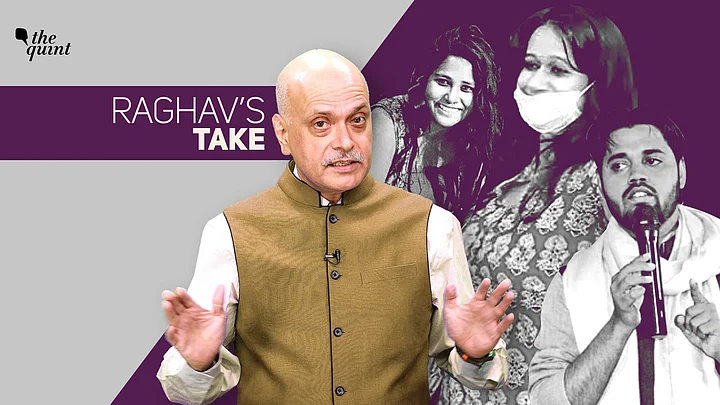Delhi High Court's bail to the three UAPA accused activists and the Government of India's 'base effect' justification for inflation, The Quint's Editor-in-Chief Raghav Bahl shares his views on some recent and pertinent, developments.
Natasha, Devangana & Asif's Bail is a Win; But Has Democracy Been 'Saved' Yet?
A celebratory chorus has greeted the Delhi High Court judgment granting bail to three straightforward student activists. “India’s democracy saved” is the general refrain.
Well, I would like to be somewhat contrarian here.
Don’t get me wrong. Of course, I am delighted that the utterly vindictive ordeal for three bright young students has been temporarily alleviated. I am also overjoyed that the state’s shenanigans have been called out in blinding terms, ie based on “alarming and hyperbolic verbiage”.
The state has been rightly castigated for using draconian terror laws to suppress constitutional protest, with the court liberally sprinkling words like ‘wanton’, ‘frivolous’, ‘serious’, and ‘grave’ in its judgment.
The court has correctly demolished the dangerous argument wherein the State wants to charge people who are “likely to threaten a terrorist action”, as opposed to the established principle of “intention to indulge in a terrorist act” – if the government’s position were to be accepted, just about anybody, including authors of similar columns, can be rounded up on a contrived “likelihood”.
The most laudable extract from the judgment gives an absolutely clean chit to the students: “We can discern no specific or particularised allegation, much less any material, to bear out the allegation that the appellant incited violence, what to talk of committing a terrorist act or a conspiracy or act preparatory to the commission of a terrorist act as understood in the UAPA.”
In other words, the court is unambiguously saying that the charge sheet is false. Then why was it not dismissed?
Why is an obviously fake charge allowed to continue to harass three innocent students? Why have they been asked to furnish bonds of Rs 50,000 each? Why are they being treated like fugitives who cannot leave the country? What if they wish to attend a seminar or pursue an academic course at a foreign university? Why are they being handcuffed against doing that?
This is where I diverge from the celebratory chorus. Because our respected judges are making the right decision, delivering a severe condemnation, but stopping short of action. The police and special courts are getting an angry tap on their wrists, but nothing more.
While three innocent students had to spend over a year in jail, can’t travel abroad now, and will have to spend several more months and years fighting their cases through layers of criminal courts, even when they have done no wrong. Isn’t that an intolerable form of “non-judicial punishment”?
If our respected judges are so outraged, why don’t they lay down rules, which will outlaw such “non-judicial punishment” so that nobody dares to transgress the ‘Lakshman Rekha’? Otherwise, the state and police will be laughing at our impotence, because they would have achieved what they set out to do, ie inflict punishment for a crime that was not committed.
They always knew it was a false charge. They knew they would never get a conviction. This is why all they wanted to do was inflict “non-judicial punishment”, in which they succeeded spectacularly.
The exact playbook has been used against several public intellectuals and activists – I use the names of Vinod Dua, Gautam Navlakha, Stan Swamy, Sudha Bhardwaj, and Umar Khalid only as examples because there could be hundreds, even thousands more who are facing this scourge.
Until this malady is cured, I am unable to join the celebratory chorus. WE MUST STOP NON-JUDICIAL PUNISHMENT.
Statistic Chicanery: Why Use 'Base Effect' to Justify Inflation, But Not to Explain GDP Rise?
What’s another thing that the State subverts spectacularly? Well, statistics.
In any case, even in normal times almost everybody, from corporations to ordinary people, uses stats selectively to peddle twisted narratives.
But when a once-in-a-century disruption like the COVID-19 pandemic occurs, it allows clever governments to take statistical chicanery to epic levels. Just see the “creative lies” being pushed today.
After the GDP crashed last year, we are now boasting of becoming the “fastest growing large economy this year – the only one to post a double-digit print”. Or when exports dived in March-April 2020, to recover this year, we say with much bombast that “exports leapt over 50%, the highest rate ever notched in 70 years of Independent India”.
But when inflation scales a scalding 12%, the government is quick to trot out a “justification” saying it’s because of the “base effect”. But pray, dear GOI, why forget about the “base effect” in GDP and export boasts? Why use the “base effect” to neutralise only bad news, but hide the context in talking up the good news?
This is outright intellectual dishonesty. Which is why we need to change the base year when such a huge disruption occurs, ie declare FY 20-21 as a “zero year”, to be disregarded for measuring trend rates. Instead, every key metric should be based on FY 19-20 as the base year, thereby making the current year’s data points far more scientific.
